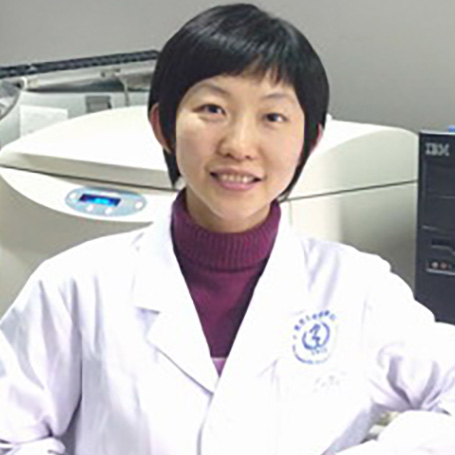Department of Cell Biology
Yun Bai

Yun Bai Professor
Contact Information
E-mail: baiyun@bjmu.edu.cn
Biography
Yun Bai, Ph.D., Professor in the Department of Cell Biology, School of Basic Medical Sciences, Peking University Health Science Center. Her research focuses on stem cell biology and cancer immunotherapy, with an emphasis on developing CAR-T and TCR-T cells combination therapies for solid tumors and advancing their clinical translation. Dr. Bai has led multiple research grants, including the National Key R&D Program of China and the National Natural Science Foundation of China. Her series of articles have been published in journals including Molecul ar Therapy , Nature Communications , Cell Discovery and Protein Cell . Dr. Bai currently serves as a committee member of the Medical Cell Biology Branch of the Chinese Medical Association and the Regenerative Medicine Branch of the Chinese Society for Anatomy.
Education and Professional Experience
1993-1998, B.M. Peking University Health Science Center
1998-2003, Ph.D. Peking University Health Science Center
2003-2009, Instructor, Department of Cell Biology, School of Basic Medical Sciences, Peking University Health Science Center
2009-2017, Associate Professor, Department of Cell Biology, School of Basic Medical Sciences, Peking University Health Science Center
2010- 2011, Visiting scholar, LNS, NIA, National Institutes of Health
2017-Present, Professor, Department of Cell Biology, School of Basic Medical Sciences, Peking University Health Science Center
Research Interests
Stem Cell Biology and Cancer Immunotherapy
Representative Peer-Reviewed Publications
1. Che X#, Zheng S#, Sun Y#, Wang X, Zhang P, Cao J, Bai Y. Multi-engineered T cell vaccine boosting TCR-T cell therapy enhances anti-tumor function and eradicates heterogeneous solid tumors. Molecular Therapy, 2025, S1525-0016(25)00408-3.
2. Zheng S#, Che X#, Zhang K, Bai Y*, Deng H*. Potentiating CAR-T cell function in the immunosuppressive tumor microenvironment by inverting the TGF-β signal. Molecular Therapy, 2025, 33(2):688-702.
3. Jiang M#, Chen X#, Song Y, Wei M, Cao J, Lu W, Lan F, Bai Y*, Cui M*. NEXN deficiency leads to dilated cardiomyopathy in human pluripotent stem cell-derived cardiomyocytes. Stem cell research & therapy, 2025, 16 (1), 402.
4. Li Z#, Ma L#, Gao Z#, Wang X, Che X, Zhang P, Li Y, Zhang Q, Liu T, Sun Y, Bai Y*, Deng H*. Identification and validation of tumor-specific T cell receptors from tumor infiltrating lymphocytes using tumor organoid co-cultures. Cancer Immunology Immunotherapy, 2024, 73(9):164.
5. Zhao J#, Dong J#, Deng C#, Zhang Q, Sun S, Li H, Bai Y*, Deng H*. Enhancing T cell anti-tumor efficacy with a PD1-TIGIT chimeric immune-checkpoint switch receptor. Oncoimmunology, 2023, 12(1):2265703.
6. Jiang M, Song Y, Chen X, Wen J, Zhu M, Wei M, Lan F, Cui M*, Bai Y*. COX6A2 deficiency leads to cardiac remodeling in human pluripotent stem cell-derived cardiomyocytes. Stem Cell Research & Therapy, 2023, 14, 357.
7. Liu B#, Chen S#, Xu Y#, Lyu Y#, Wang J, Du Y, Sun Y, Liu H, Zhou H, Lai W, Xue A, Yin M, Li C, Bai Y*, Xu J*, Deng H*. Chemically defined and xeno-free culture condition for human extended pluripotent stem cells. Nature Communications, 2021, 12(1): 3017.
8. Deng C#, Zhao J#, Zhou S, Dong J, Cao J, Gao J, Bai Y*, Deng H*. The Vascular Disrupting Agent CA4P Improves the Antitumor Efficacy of CAR-T Cells in Preclinical Models of Solid Human Tumors. Molecular Therapy. 2020, 28(1): 75-88.
9. Luo Z#, Liu Z#, Liang Z, Pan J, Xu J, Dong J, Bai Y*, Deng H*, Wei S*.Injectable Porous Microchips with Oxygen Reservoirs and an Immune-Niche Enhance the Efficacy of CAR T Cell Therapy in Solid Tumors. ACS Applied Materials & Interfaces. 2020, 12(51): 56712-56722.
10. Li H#, Zhao C#, Xu J, Xu Y, Cheng C, Liu Y, Wang T, Du Y, Xie L, Zhao J, Han Y, Wang X, Bai Y*, Deng H*. Rapid generation of gene-targeted EPS-derived mouse models through tetraploid complementation. Protein Cell, 2019, 10(1): 20-30.
11. Zhang S#, Lin X#, Li G, Shen X, Niu D, Lu G, Fu X, Chen Y, Cui M*, Bai Y*. Knockout of Eva1a leads to rapid development of heart failure by impairing autophagy. Cell Death & Disease, 2017, 8(2): e2586.
12. Zhong L#, Zhou J#, Chen X, Liu J, Liu Z, Chen Y, Bai Y*. Quantitative proteomics reveals EVA1A-related proteins involved in neuronal differentiation. Proteomics, 2017, 17(5). doi: 10.1002/pmic.201600294.
13. Shen X#, Kan S#, Liu Z, Lu G, Zhang X, Chen Y, Bai Y*. EVA1A inhibits GBM cell proliferation by inducing autophagy and apoptosis. Experimental Cell Research, 2017, 352(1):130-138.
14. Li M#, Lu G#, Hu J#, Shen X, Ju J, Gao Y, Qu L, Xia Y, Chen Y*, Bai Y*. EVA1A/TMEM166 Regulates Embryonic Neurogenesis by Autophagy. Stem Cell Reports, 2016, 6(3): 396-410.
15. Shen X, Kan S, Hu J, Li M, Lu G, Zhang M, Zhang S, Hou Y, Chen Y*, Bai Y*. EMC6/TMEM93 suppresses glioblastoma proliferation by modulating autophagy. Cell Death & Disease, 2016, 7: e2043.
16. Bai Y*, Kan S, Zhou S, Wang Y, Xu J, Cooke JP*, Wen J*, Deng H*. Enhancement of the in vivo persistence and antitumor efficacy of CD19 chimeric antigen receptor T cells through the delivery of modified TERT mRNA. Cell Discovery, 2015,1,15040.
17. Bai Y, Lathia JD, Zhang P, Flavahan W, Rich JN, Mattson MP. Molecular targeting of TRF2 suppresses the growth and tumorigenesis of glioblastoma stem cells. Glia, 2014, 62(10):1687-98.
18. Meng Z, Li M, He Q, Jiang S, Zhang X, Xiao J, Bai Y*. Ectopic expression of human angiopoietin-1 promotes functional recovery and neurogenesis after focal cerebral ischemia. Neuroscience, 2014, 267: 135-46.

